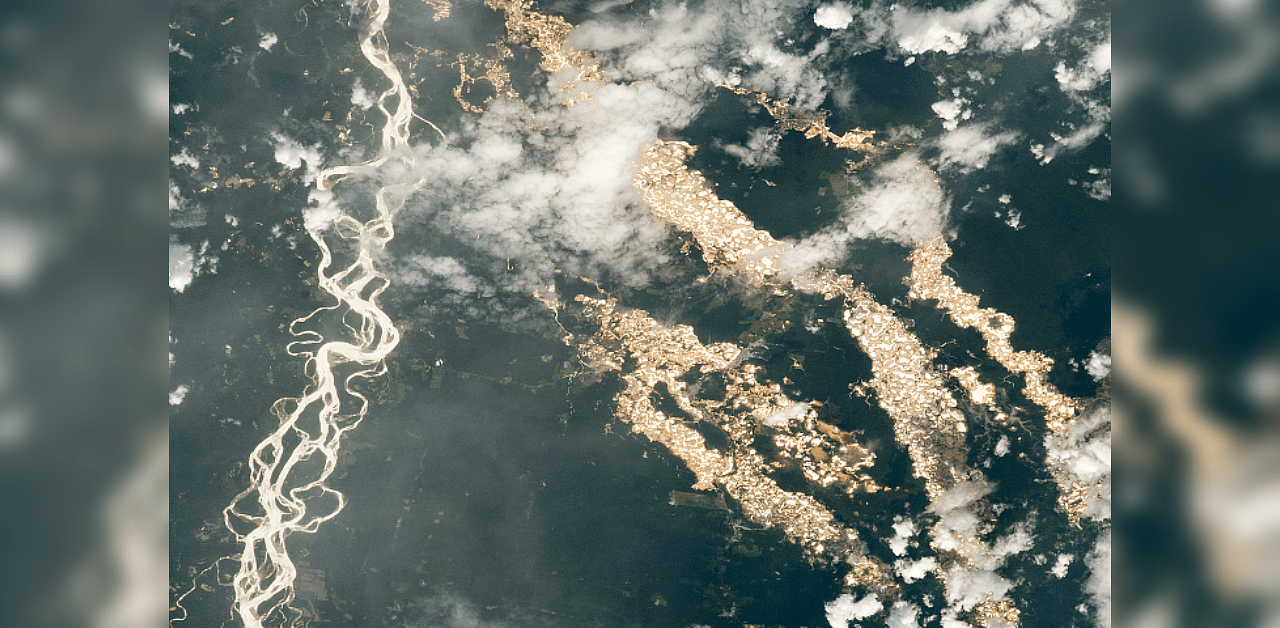
Delicately, Jose Valenzuela places a small quantity of gold powder on a digital scale. He sets it aside to pay for fuel in the Venezuelan Amazon, where the precious metal is the currency of choice.
Valenzuela works as an assistant on the merchant boat of Olver Ramirez, with whom he navigates the Orinoco river through the Yapacana National Park in Amazonas state, some 750 kilometres (466 miles) south of the capital Caracas.
The region is so remote that the people who live here refer to Venezuela as a distant country. They are closer to Colombia and Brazil.
The two men dock their narrow wooden boat at Cariche, one of many indigenous settlements along the riverbank.
They sell some goods to clients on the riverbank and settle in for a short rest.
On the motorized boat, a piece of cardboard announces the products for sale, with prices in "lines" of gold dust in a region where illegal mining feeds many mouths.
One "line" is a tenth of a gram of gold -- its value fluctuates with the exchange rate of the Colombian peso.
On the day Valenzuela and Ramirez arrive in Cariche, the price for a line is set at some 20,000 Colombian pesos.
This is the equivalent of about $6, but the greenback is little used in this region unlike in the rest of Venezuela where it is the de facto currency.
The cardboard sign advertises a can of tuna for one line of gold dust, a liter of oil for two, a kilo of milk powder for three or four lines.
A litre of gasoline costs one line -- about 10 times the price charged at the pump in Colombia, where it comes from.
Caracas is the only city in Venezuela where it's possible to fill a tank without queuing for days.
Added to the price of fuel, explain the boatmen, are the bribes that must be paid along the route to security agents and indigenous leaders who charge for transit through their territories.
Completely absent is the Venezuelan currency, bolivars.
"They are worthless," says Valenzuela.
A barefooted Ramirez says the notes are sometimes used to wrap the gold, but never as legal tender.
"You weigh and then you throw the bill away," he explains, swaying in a hammock on the boat as he swats at mosquitoes.
On this trade day, the Orinoco is tranquil, and the men have a stunning view of the Yapacana mountain that gave the park its name.
But beyond the beauty lies a sad tale of natural destruction and violence.
Activists say the area is being ravaged by illegal gold mining, aided by military personnel who turn a blind eye in exchange for bribes.
Despite its location in a protected park that hosts a treasure trove of biodiversity, gold mining is growing by 242 hectares -- almost 300 football fields -- per year, according to the NGO SOS Orinoco.
In its last report in 2019, the group said mining activity in the park already covered 2,227 hectares.
From local towns, boats set out for the park on a regular basis with heavy mining equipment that arrives by plane on small runways before making its way downstream on the Orinoco.
NGOs say the damage being done to the freshwater ecosystem is irreversible.
But matters are complicated by locals insisting the National Guard has no authority over the river system.
The law that prevails is indigenous, and in the mine it is "the captain" who calls the shots -- often someone from a criminal organization, or a paramilitary or guerrilla group who rules with an iron fist.
"He (the captain) is the one who maintains order," says Misael Herrera, a 19-year-old miner.
"You pay him for what you find."
Access to these areas is dangerous and reports of murders are frequent as different groups fight for supremacy.
Herrera says he started mining five years ago "out of necessity" and claims to have unearthed several "chocanos" -- gold nuggets about half-a-thumb in size.
Yet he earns just enough to buy the basic necessities.
"I have never seen a rich miner," adds merchant Ramirez, who started his venture a year ago when he sold his car to buy a boat. He earns about $100 a week, which he sends back home to his family.
"To earn $100 in Venezuela, you need to do miracles," he says.